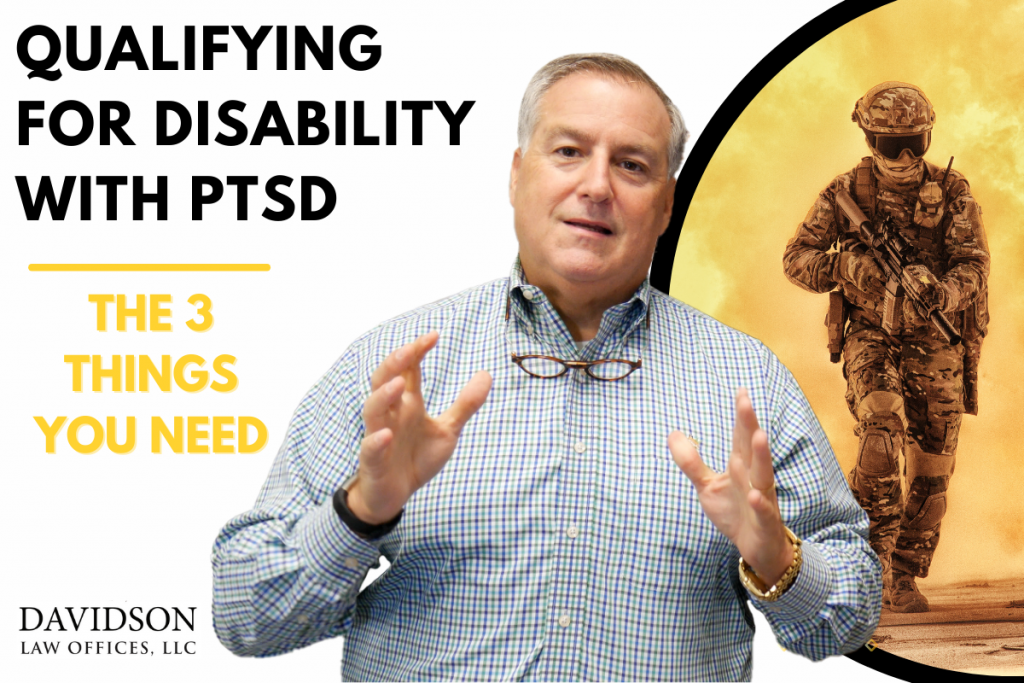Are you a veteran suffering from PTSD as a result of traumatic events that you experienced while in service? It is likely that you are entitled to disability benefits through the VA. These Disability Indemnity Compensation (DIC) benefits require that you meet several criteria relating to your diagnosis and your time served. Here we’ll discuss DIC as it relates to PTSD claims and the top three things you need to make sure you qualify.
Whether you have PTSD or another injury/illness from your military service, there are three basic requirements for Disability Indemnity Compensation or DIC. As we list these requirements, we’ll discuss how they specifically apply to a PTSD case.
Veterans Disability Claim Requirements
#1 You have to have a service-related injury.
You have to have some kind of medical evidence showing that you have an injury or diagnosis. The injury or diagnosis doesn’t have to be one that manifested itself during service. It could be something that manifested after your service, but that was a result of your service. Either way, you need some type of injury or diagnosis documented in your medical files.
#2 There has to be some kind of link between your injury and your service.
In the case of a PTSD claim, most veterans are not diagnosed with PTSD while they’re in service. This is usually something that is diagnosed after their service is completed. So how do you win that claim? You do it by proving that you incurred a traumatic event during service, which resulted in the diagnosis.
Here are a couple examples of some really traumatic events that we’ve heard from clients in our office. The Battle of Duc Lap occurred during the Vietnam War and lasted 3-5 days — I can’t recall exactly how long it was. But it was a battle in which many Americans were killed. One of our clients was left in the foxhole with his dead and dying fellow soldiers and they were unable to evacuate for a long time. As a result, he developed post traumatic stress disorder when he returned home.
Another example comes from a client who was on an air base in Thailand. He was involved in a fire fight and one of his partners was shot in the stomach. He was there, witnessed it first hand, and actually had to care for his partner until the medics arrived. This type of life-changing event is usually the primary cause of post traumatic stress disorder. Being able to provide a link between the events you experienced and the diagnosis is key to getting a claim approved.
#3 You have to have some kind of credible or supporting evidence.
Many times military records are pretty scarce when it comes to your specific location at a particular point in time during your service. Maybe you weren’t injured yourself, but you were involved in a battle and experienced traumatic events. Unless you’re injured, you’re likely not going to find any military records stating you were involved in a specific battle. As a result, we often have to find individuals who were in your unit and were involved in the same incident. We can then obtain affidavit stories or accounts from them to prove that you were there.
Getting an Approved PTSD Diagnosis
Now let’s talk about the post traumatic stress disorder diagnosis itself. As you may know, this is not an easy diagnosis. The Office of Veterans Affairs uses something called the DSM5 criteria for diagnosing PTSD. This is not something that every medical doctor is qualified to do. You need a specialist. If you don’t have one, we can help you find a medical doctor, psychiatrist, or psychologist that is trained with these types of diagnoses and can help get yours approved.
The VA also has its own doctors that can diagnose the condition and verify that your condition is indeed post traumatic stress disorder. And if we’re able to get the diagnosis approved that way, that’s great. But we still need to have that supporting evidence that links your diagnosis to something that happened while you were in service.
So to recap here, there are three basic requirements for any Disability Indemnity Compensation (DIC) claim through the VA. You need to have a service-related injury or diagnosis. You need to have a link between your service and the particular injury or diagnosis from which you suffer. And you need to have supporting, credible evidence regarding your injury and the circumstances that caused it. Many times the military medical records aren’t complete as to where you served. And if you were in a Special Forces unit, the records aren’t going to have information regarding all of the undisclosed locations your unit was operating.
If you are suffering from PTSD and need help getting your disability claim approved, we’re here to help! Please complete this form or give us a call at (229) 226-8183. We’ll be happy to help you obtain all the supporting documents and information you need to get approved for Veterans disability benefits.
If you’d like to see this blog in video format, you can watch it below. Please be sure to SUBSCRIBE to our YouTube channel and click the bell notification button so that you’re notified each time we publish a new video.

